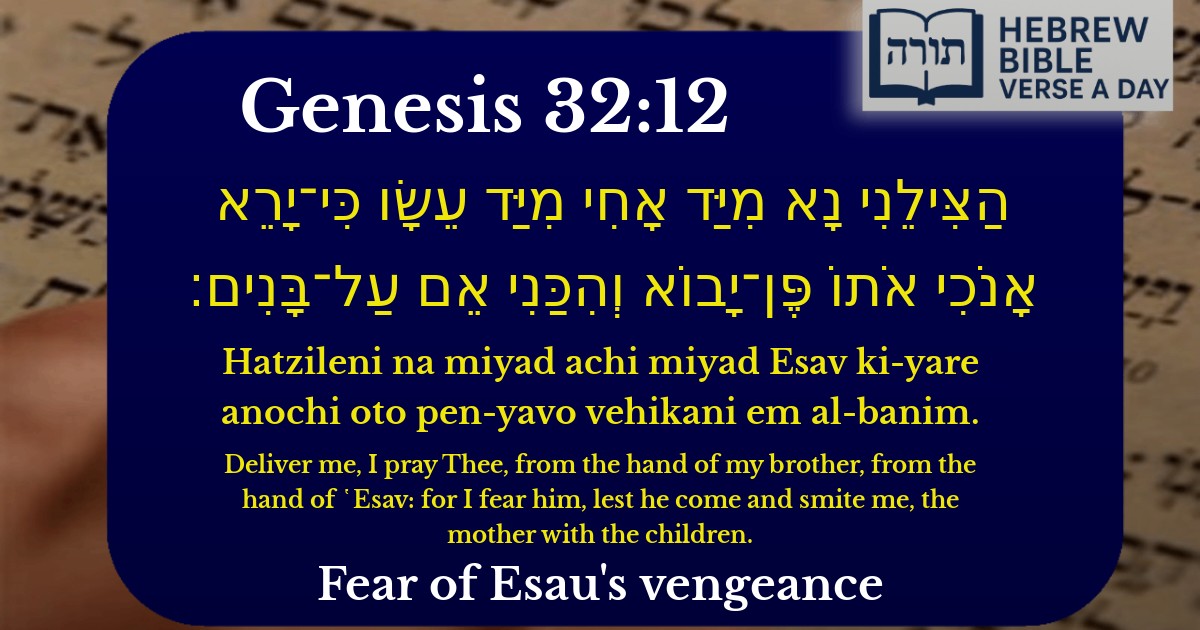Join Our Newsletter To Be Informed When New Videos Are Posted
Join the thousands of fellow Studends who rely on our videos to learn how to read the bible in Hebrew for free!
Hebrew Text
הַצִּילֵנִי נָא מִיַּד אָחִי מִיַּד עֵשָׂו כִּי־יָרֵא אָנֹכִי אֹתוֹ פֶּן־יָבוֹא וְהִכַּנִי אֵם עַל־בָּנִים׃
English Translation
Deliver me, I pray Thee, from the hand of my brother, from the hand of ῾Esav: for I fear him, lest he come and smite me, the mother with the children.
Transliteration
Hatzileni na miyad achi miyad Esav ki-yare anochi oto pen-yavo vehikani em al-banim.
Hebrew Leining Text
הַצִּילֵ֥נִי נָ֛א מִיַּ֥ד אָחִ֖י מִיַּ֣ד עֵשָׂ֑ו כִּֽי־יָרֵ֤א אָנֹכִי֙ אֹת֔וֹ פֶּן־יָב֣וֹא וְהִכַּ֔נִי אֵ֖ם עַל־בָּנִֽים׃
הַצִּילֵ֥נִי נָ֛א מִיַּ֥ד אָחִ֖י מִיַּ֣ד עֵשָׂ֑ו כִּֽי־יָרֵ֤א אָנֹכִי֙ אֹת֔וֹ פֶּן־יָב֣וֹא וְהִכַּ֔נִי אֵ֖ם עַל־בָּנִֽים׃
🎵 Listen to leining
Parasha Commentary
📚 Talmud Citations
This verse is quoted in the Talmud.
📖 Berakhot 4b
The verse is referenced in the context of discussing the prayers of the righteous and how Jacob prayed for deliverance from Esau.
📖 Sanhedrin 98b
The verse is mentioned in a discussion about the future redemption and the fears of the righteous.


Context of the Verse
This verse (Bereshit 32:12) is part of Yaakov Avinu's prayer to Hashem as he prepares to encounter his brother Esav after many years of separation. Yaakov expresses deep fear of Esav's potential violence and pleads for divine protection. The phrase "the mother with the children" is particularly striking and has been extensively discussed by commentators.
Rashi's Explanation
Rashi explains that Yaakov feared Esav would attack not only him but also his family, including mothers and children. Rashi notes that the double language "from the hand of my brother, from the hand of Esav" reflects Yaakov's concern that Esav might act both as a brother (with some familial restraint) and as the wicked Esav (with full hostility). This duality captures the complexity of their relationship.
Ibn Ezra's Insight
Ibn Ezra focuses on the phrase "the mother with the children," suggesting it is an idiom meaning total destruction - that Esav would show no mercy, not even sparing mothers and their children. This reflects the brutal nature Yaakov anticipated from Esav.
Ramban's Deeper Interpretation
The Ramban provides a more profound reading, suggesting that Yaakov's fear extended beyond physical harm. He was concerned about spiritual consequences - that Esav might influence or corrupt Yaakov's family. The mention of "mother and children" symbolizes the continuity of the Jewish people, which Yaakov sought to protect from Esav's negative influence.
Midrashic Perspectives
Halachic Implications
The Rambam (Hilchot Tefillah 1:2) cites this verse as an example of proper prayer - combining personal request with acknowledgment of God's past kindness (as Yaakov does in the surrounding verses). This demonstrates the Jewish approach to prayer during times of danger.
Chassidic Interpretation
The Baal Shem Tov taught that Yaakov's fear of "the mother with the children" represents concern that Esav might attack the "mother" (the root and source) of Jewish faith together with its "children" (the practical mitzvot). This spiritual interpretation sees Yaakov protecting both the essence and expression of Judaism.